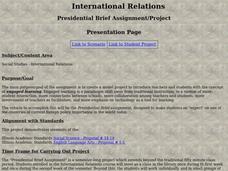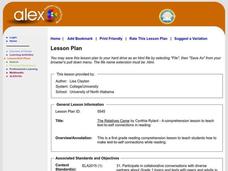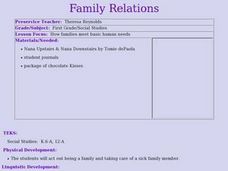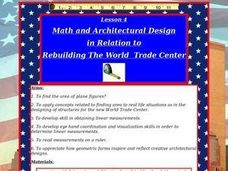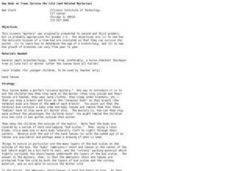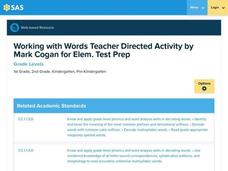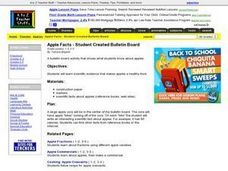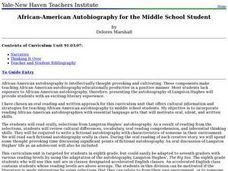Curated OER
Relating Fractions, Decimals, and Percents
Fifth graders participate in a lesson that is concerned with the concept of telling the differences between a fraction, decimal, and percent. There is a good example of conversion in the lesson.
Curated OER
Time Travel, Black Holes, and Relativity
Students read the novel, The Time Machine, and compare H.G. Well's perceptions of the future with those presented in The Third Wave, by Alvin Toffler. They research current scientific and mathematical theories that relate to space and time.
Curated OER
International Relations
Ninth graders are expected to have an in-depth understanding of a country's national profile, current events, and projected foreign policy options and the impact of those options on current world affairs.
Curated OER
Relative Weight
Second graders distinguish the difference between pounds and ounces and arrange manipulatives from heaviest to lightest.
Curated OER
The Relatives Came
First graders participate in listening to the book, The Relatives Came by Cynthia Rylant. They practice comprehension by making text-to-self- connections while reading. They collaborate with a small group in order to participate in a...
Curated OER
Exploring Tolerance and Related Essential Questioning on Acceptance and Diversity
Learners explore the concept of diversity. They discuss ways in which people differ. Students visit various websites and discuss the vocabulary words found on these sites. They read stories from various countries and discuss the people...
Curated OER
Related Number Pairs
Third graders use tables to organize and display related pairs of numbers, such as the relationship of the number of insects to the total number of legs. They generate a table of related number pairs based on a real-life situation,...
Curated OER
Relative Dating in Archaeology
Students create a timeline that explains how ancient cultures used artifacts. In this Relative Dating in Archaeology lesson, students examine artifacts and draw conclusions about their origins. Then students analyze antiquated objects or...
Curated OER
Relative Size - Wide and Narrow
Students distinguish between wide and narrow manipulatives and sort accordingly. They use construction paper strips, ribbon, fabric strips, books, popsicle sticks and sock puppets.
Curated OER
Arthur's Teacher's Trouble
First graders are working on a literature focus unit based on Arthur's Teacher Trouble. The purpose of this language arts lesson is to strengthen observation skills.The teacher will explain the project to the entire class and be...
Curated OER
Roll the Union On: the National Labor Relations Act and the Rise of the Congress of Industrial Organizations (CIO)
Students examine the many different programs Roosevelt created as a result of the Great Depression. They research the National Labor Relations Act and explore what working conditions were like during that time.
Curated OER
Electricity and Magnetism: Are They Related?
Students explore electricity and magnetism. Through the use of role play, students simulate being a scientist. Experiments are performed during the simulation to discover the relationship between electric current and magnetism. After...
Curated OER
Logo Design and Ad Campaign Relating to Forestry Management.
Students explore organizations that promote effective marketing strategies and create their own visual symbols that benefit effective forestry cultivation. In this creative lesson students study logos of organizations, create their own...
Curated OER
Math and Architectural Design in Relation to Rebuilding The World Trade Center
Learners discover building plans and practice reading measurements. In this architectural design lesson, students investigate the areas of the specific World Trade Center locations that need to be rebuilt and determine the cost....
Curated OER
Human Ecology: How it Relates to Population
Ninth graders are introduced to the concept of population. In groups, they research the problems associated with overpopulation and underpopulation. They practice calculating birth and death rates and discus how they can be used to...
Curated OER
Mystery Cemetary: Teachers
Students examine and analyze the skeletons of various bodies that could represent a cemetary. In groups, they identify a set of common characteristics in which the skeletons are grouped. To end the lesson, they answer questions related...
Curated OER
How Buds on Trees Survive the Cold (and Related Mysteries)
Students solve a science mystery. In this biology lesson plan, students see how the delicate tissues of a tree bud are insulated so that they can survive the winter and learn how to determine the age of a branches and twigs.
Pennsylvania Department of Education
Working with Words Teacher Directed Activity by Mark Cogan for Elem. Test Prep
Young scholars build word families. In this interactive language arts activity, students visit a website where they play a game creating word families. Young scholars may print out their work when finished.
Curated OER
Apple Facts - Student Created Bulletin Board
Students research the health benefits of apples and create a bulletin board showing the scientific facts they find.
Curated OER
Relating to William Johnson
Third graders examine and evaluate works of art by William Johnson. They discuss the painting style of Johnson, conduct Internet research, complete an informational worksheet, and create a self-portrait using paint.
Curated OER
Ancient China: Student Created Word Search Puzzles
Sixth graders classify and organize information about ancient China. In this Chinese history activity, 6th graders create word search puzzles and record the processes they used to create them.
Curated OER
African-American Autobiography for the Middle School Student
Students are introduced to the characteristics of an autobiography. For each author, they research their life and works and discuss why it reflects different time periods of African-Americans. In groups, they brainstorm characteristics...
Curated OER
Wet-Dry Bulb Hygrometers: Measuring Relative Humidity and Apparent Temperature
Young scholars work in groups of 4 for the activity/activity part of this exercise. They know that clouds are formed by the condensation of water vapor, affect weather and climate. Also that global patterns of atmospheric movement...




